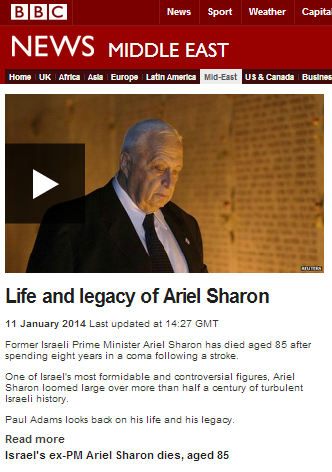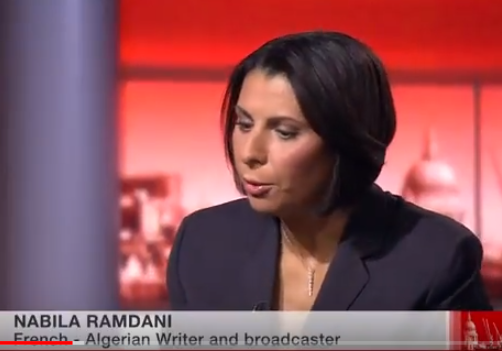Like the rest of the media, the BBC has had ample advance time in which to prepare parts of its coverage of the death of Ariel Sharon. It is therefore interesting to look at how that time has been spent and what pre-planned messages the BBC wishes to communicate to its audiences.
The BBC News website ran a live page with the rather clumsy title “As it happened: Ariel Sharon dies” on January 11th.
Featured prominently on that page is a filmed report which was clearly made in advance and is more than seven minutes in length – and which also appeared on BBC television news programmes and in addition elsewhere on the BBC News website – by BBC World Affairs correspondent Paul Adams.
The report opens with Adams narrating.
“The king of Israel to his followers, the bulldozer to admirers and detractors alike. Ariel Sharon’s turbulent story and contradictions spanned more than sixty years of Israeli history. In and out of uniform he was always a warrior but what did he achieve and had he lived, what more did he have in mind for Israel and the Palestinians?
He was certainly decisive, provided the decisions were his. In 1973 he crossed the Suez Canal and helped to defeat the Egyptian army. It was risky, unorthodox, perhaps even crazy.”
The report then cuts to archive footage of Sharon speaking in 1973.
“Without madness I don’t believe that anybody would have done it. To believe that you can do it during one night – a certain element of madness should be there.”
Back to Adams:
“His maverick style infuriated his superiors but his men loved it and him.”
The film then shows Avi Dichter speaking.
“Yeah, very popular. I remember as a combatant of twenty-one years old during the Yom Kippur war in ’73 we were very motivated to go, to follow the leader, to follow the commander and we knew that if you follow Ariel Sharon, you’ll – at the end – you’ll find your destination. You are not going to get lost.”
The report then cuts to Pathe archive footage from 1953 in which the announcer is saying:
“The tiny village of Qibya on the Israel-Jordan border is in ruins…”
Adams cuts in:
“But there was a dark, brutal side too, from retaliatory raids on Palestinian villages in the 1950s to the devastating assault on Beirut thirty years later, culminating in the massacre of Palestinian refugees at the hands of Israel’s Lebanese allies.”
So, in the opening minutes of the film audiences have heard “crazy”, “madness”, “dark” and “brutal”, but with absolutely no context provided regarding the Egyptian attack which began the Yom Kippur war and ended up with Israeli forces crossing the Suez Canal, no mention of the Fedayeen raids on Israel and no explanation of the PLO’s presence in Lebanon and its attacks on civilians in northern Israel which brought about the first Lebanon war.
The film then cuts to footage of Sharon pointing to a map and saying:
“We had a problem here; how to keep in our hands…”
Adams cuts in:
“Throughout it all, Ariel Sharon was passionate about the land, often to be found like this – map in hand – explaining the significance of holding on to territory captured in 1967.”
Again, no context is provided as to why the Six Day War broke out: as far as Adams is concerned, all BBC audiences need to know is that Israel captured territory. He goes on:
“To Jewish settlers he was a hero, telling them to grab every hilltop while they could.”
The film then features an interview with Yisrael Medad who is labelled on screen as “Spokesman Yesha Council of Jewish Communities”.
“He pushed, he manipulated, he exploited every opportunity to make sure that as many Jews as possible were living in as many locations throughout the territories that we now administer after the ’67 war.”
Adams goes on:
“But Sharon’s attachment to the land was less spiritual, more strategic. Giving this up was simply too risky.”
Undated footage is then shown of Ariel Sharon saying:
“Israel is against having a Palestinian state and the government – all the government – were against having a Palestinian state here because of the dangers.”
Next to be interviewed is the old BBC favourite Rashid Khalidi who, despite the BBC’s supposed commitment to “summarizing the standpoint” of interviewees, is labelled on screen simply as “Professor Rashid Khalidi , Author – ‘Brokers of Deceit'” and with absolutely no reference to his activism and political agenda. Khalidi says:
“The evil done by the settlement process from the very beginning of the occupation in ’67 – but put on steroids by Sharon from when he was Minister of Agriculture in 1977 – ah – I think will be with us for a very, very long time if not permanently. It has changed the face of Palestine.”
So, audiences have now been led towards an emotion-based view of settlements – and by inference, the people who built and live in them – as doing “evil” and led to believe that there is an entity called “Palestine” which has been “changed”. Adams then lets slip his mask of BBC impartiality even further. [emphasis added]
“For years this colonisation of occupied territory set Israel at odds with its closest ally, the United States. It saw settlements as an obstacle to peace. But violence, Sharon countered, was a much greater obstacle. With suicide bombs claiming dozens of lives and America pursuing its ‘War on Terror’ after 9/11, Sharon’s argument was simple: we’re all in this together.”
Along with the inaccurate description of “colonization”, here we see Adams transform a campaign of terrorism orchestrated by the Palestinian leadership into amorphous, disconnected “suicide bombs” and the true number of casualties downplayed by a factor of hundreds. Adams goes on:
“But he did something more: he got George Bush to agree in writing that some settlements would never be removed.”
The film then features an interview with another of the BBC’s favourite historians – Avi Shlaim – who is also presented on screen in a manner which does nothing to “summarise” his anti-Zionist “viewpoint”: “Professor Avi Shlaim, Oxford University”. Shlaim expands on Adams’ previous point by edging audiences towards conspiracy theories of Zionist influence and power.
“The letter that George Bush wrote to him is his greatest achievement because he asked for an American commitment to support Israel’s negotiating position in writing and he got it in writing and he was very proud of that letter from Bush. He called it a second Balfour Declaration. So under the influence of Ariel Sharon, George Bush reversed American foreign policy.” [emphasis added]
Adams continues:
“But Sharon was pragmatic too. If giving up land was risky, he saw that sometimes holding on was worse. The forcible removal of nine thousand Jewish settlers from the Gaza Strip was, for him, a small price to pay for no longer having to take account of Gaza’s one and a half million Palestinians.”
The film then cuts to another interview with Yisrael Medad who is presented as before.
“Too many of us today will not remember the good days, but only remember the bitterness of the fact that he failed us at a moment that we thought we had someone in a position of power to assure our future forever.”
Erasing from his account both Israel’s efforts to make peace during the Oslo years and the Palestinian leadership’s response to those overtures in the form of the second Intifada, Adams goes on:
“But Ariel Sharon didn’t consult the Palestinians either – he was too busy fighting them. Yasser Arafat was an enemy to be surrounded and humiliated in his head-quarters. With no peace partner, he said, we have to take decisions ourselves. The wall – or separation barrier – was one of them. Initially for security, but a clear statement too of where a future border might be drawn; cutting off even more Palestinian territory – part of Sharon’s enduring legacy.”
There’s that “Palestinian territory” again – with no mention whatsoever of Area C or Final Status negotiations. There too is what has become the BBC’s standard yet obvious misrepresentation of Sharon’s initial opposition to the construction of an anti-terrorist fence.
The film then returns to Avi Shlaim who – in contravention of BBC editorial guidelines – is once again presented to audiences only by the title of the academic institution at which he works.
“Despite Sharon’s disappearance from the political scene, ah, his legacy looms very large in Israeli politics because he was the architect of a new national consensus which was based on unilateralism.”
Shlaim of course provides no evidence for his bizarre claim of a “national consensus” and has apparently never heard of Ehud Barak’s 2000 unilateral disengagement from southern Lebanon. Adams continues: [emphasis added]
“Eight years on, an energetic American Secretary of State shuttles this way and that, trying to breathe some kind of life into the peace process. Israel’s current prime minister Binyamin Netanyahu is, if anything, more hawkish. But should he be grateful to his old rival?”
One can but hope that BBC audiences do not share Adams’ selective amnesia with regard to the Bar Ilan speech.
The film then returns to a once again misrepresented Rashid Khalidi:
“One now sees Secretary Kerry trying to impose on the Palestinians things that are part of the Israeli position; things like acceptance of Israel as a Jewish state. In fact there are some reports that Kerry is trying to impose this on all the Arab states. Ah..so I think that Sharon began a process back in the early 2000s of pulling the United States away from a nominal position as an honest broker. This – you could argue that this has been done before – but certainly since Sharon and since that 2004 letter, it’s become more noticeable and unfortunately I think maybe it’s become a permanent part of the landscape of negotiations.”
There we have audiences primed yet again to accept that notion of a mysterious – and apparently totally irresistible – Israeli influence on a United States of America which, if one chooses to believe the BBC’s preferred historians, is unable to think for itself or decide on its own foreign policy.
Adams concludes:
“Two strokes a month apart brought an abrupt end to Ariel Sharon’s long, eventful career. We simply do not know what his next move would have been. His first term in office was characteristically decisive. Israelis from the Right and the Left seemed willing to follow his lead, but the West Bank was always going to be infinitely more complicated than Gaza: far more settlers on much more strategic land. His plans would almost certainly have been too much for them; too little for the Palestinians. And in the years since it’s only got harder.”
BBC audiences learn nothing from Paul Adams’ report of Ariel Sharon the man – who lost his first wife and eldest son in separate tragic accidents and his second wife to cancer. Neither will audiences learn much about Sharon the soldier and statesman because what little cherry-picked information is provided is presented without the vital historic context necessary to understand the man and his deeds.
In fact it is all too obvious that Adams’ real aim in this pre-prepared film was not to tell BBC audiences about the life of Ariel Sharon, but to use the occasion of his death as a vehicle from which to advance a collection of myths and memes originating from a specific political viewpoint of the Arab-Israeli conflict. In that mission, he has undoubtedly reached his target. The fact that in order to do so, BBC editorial guidelines – including those on the proper presentation of interviewees – were trampled is clearly not of interest to either this particular BBC correspondent or his editors, just as long as audiences have got the ‘right’ message.
Related Articles:
A reminder of the chronology of the BBC’s Omar Masharawi story
BBC R4 presents jaundiced account of San Remo conference






